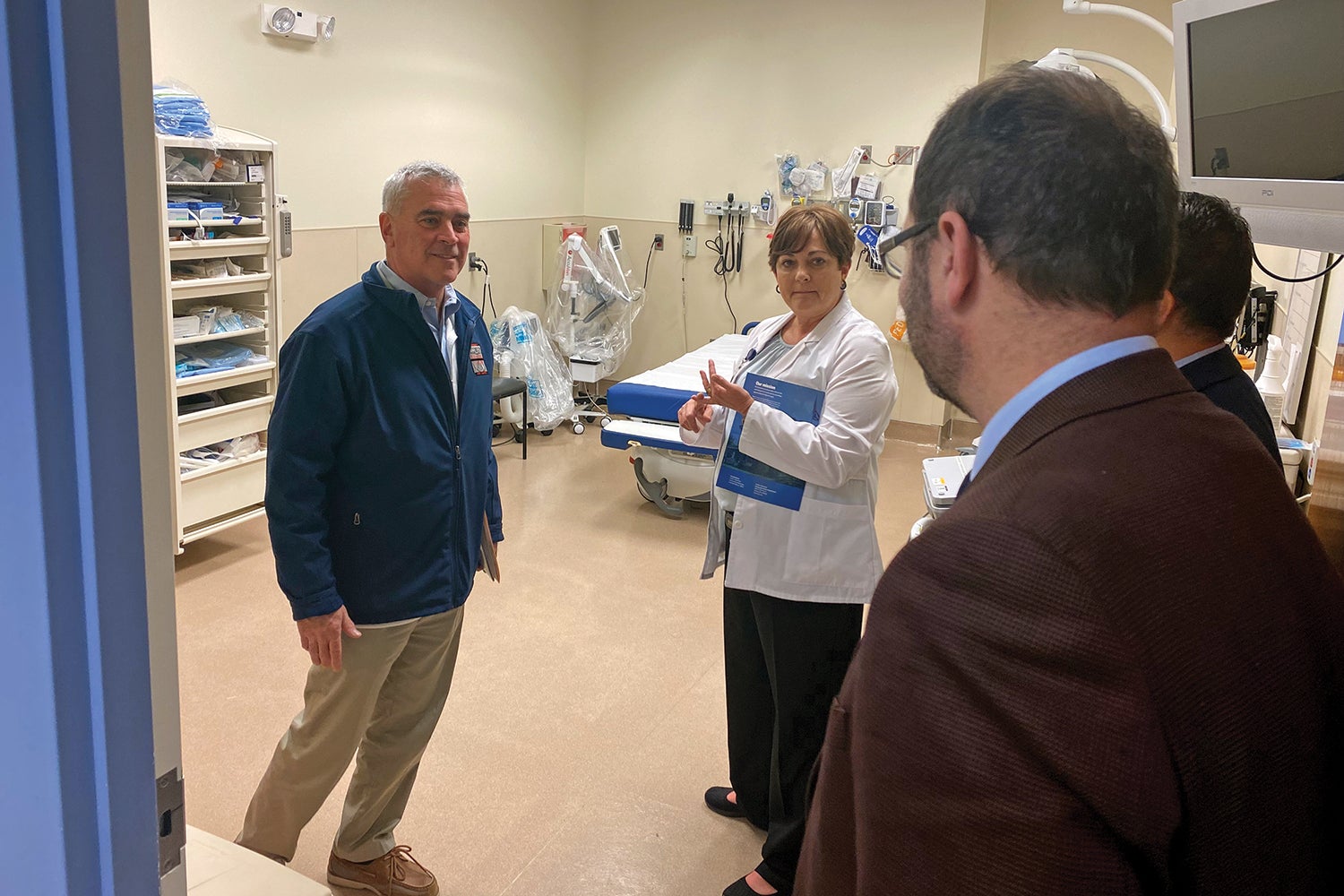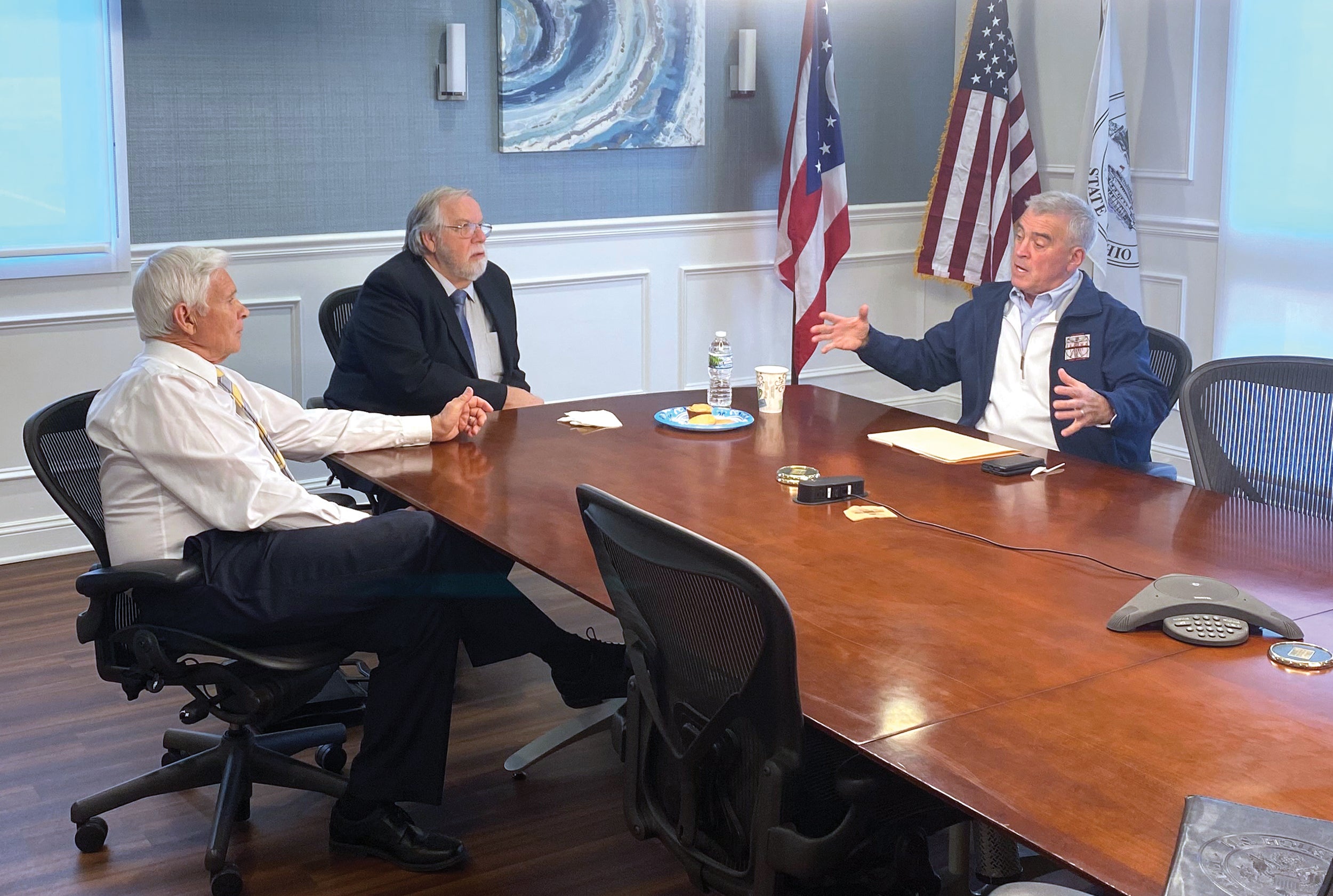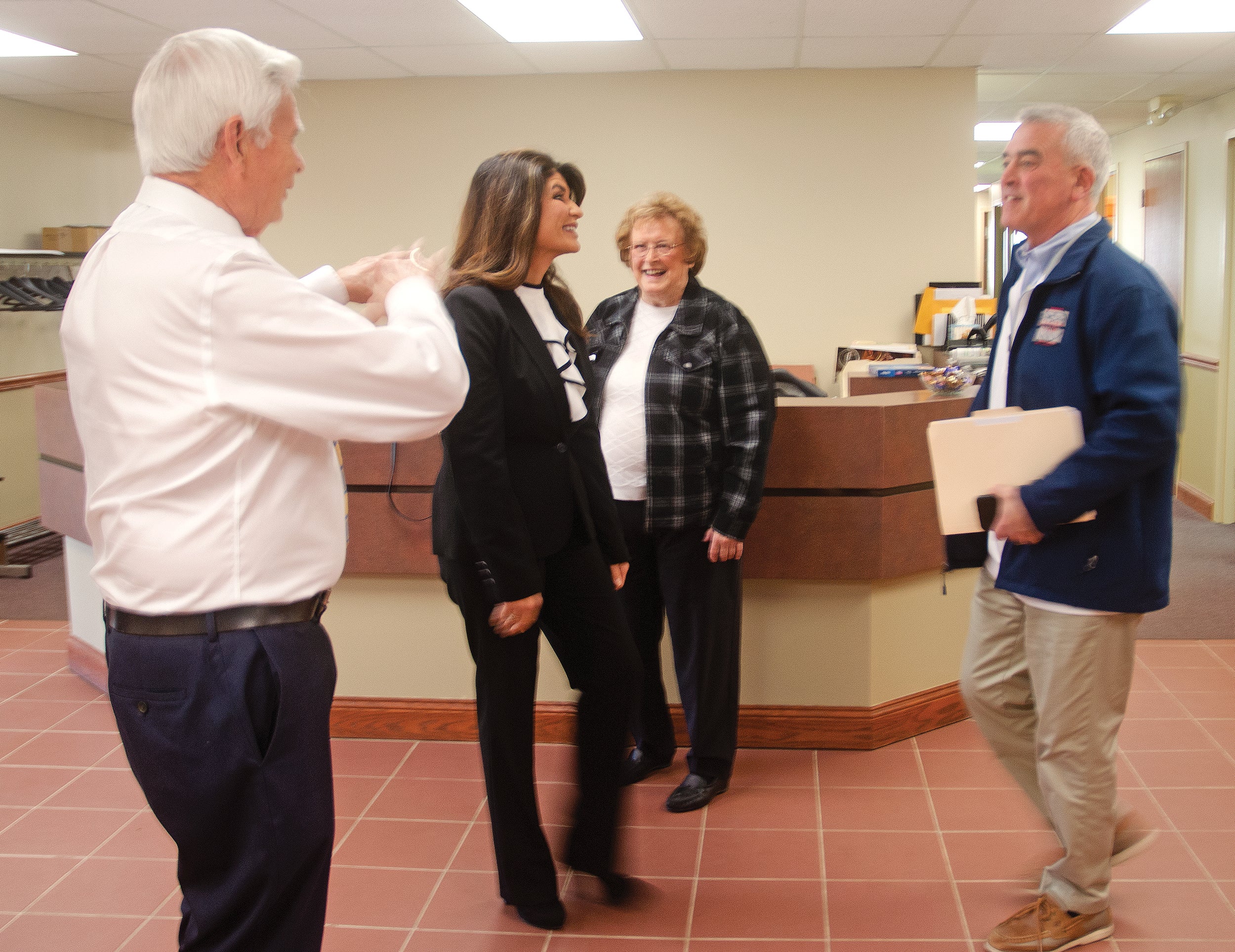Getting to know you…
Published 12:00 am Sunday, February 19, 2023

- U.S. Rep. Brad Wenstrup, R-Ohio, center, along with Ralph Kline, assistant executive director for Lawrence County CAO, left, and Marty Conley, director of the Lawrence County Convention and Visitors Bureau, looks out at the Ohio River from the dock at The Point industrial park in South Point, following a meeting with representatives from the Lawrence County Chamber of Commerce on Tuesday. Wenstrup, who represents Ohio’s 2nd Congressional District, now sees Lawrence County among his constituency following redistricting last year. (Submitted photo | Juli Stephens)

U.S. Rep. Brad Wenstrup, R-Ohio, visits the St. Mary’s Medical Center emergency room and the CAO Family Medical Center in Ironton on Tuesday. Wenstrup, who represents Ohio’s 2nd Congressional District now sees Lawrence County among his constituency following redistricting last year. (Submitted photo | Juli Stephens)
Wenstrup tours Lawrence County as part of his newly-drawn district
SOUTH POINT — The fight over congressional and legislative redistricting stretched over much of last year, and when the dust settled and maps were redrawn, Lawrence County saw a major change as a result.
The county, which has been a part of the 6th Congressional District and had been represented for a decade by Republican Bill Johnson was moved into the 2nd District, which has been held by another Republican, Brad Wenstrup, since 2012.
Wenstrup said there were eight new counties in his district as a result of the new maps and, this week, he spent a few days in Lawrence County, meeting with local leaders in business, government and other areas.
“We’re trying to hit every new county early in this term to build those relationships,” he said. “This is my third visit to Ironton.”
Since the change was made to his district, he said he has had visits from leaders at his office in Washington, D.C. and has conducted meetings by phone, Zoom and has introduced himself in mailers to constituents.
On Monday, he visited PureCycle’s plant outside Ironton and met with the Lawrence County commissioners, while on Tuesday, he visited the St. Mary’s emergency room and Family Medical Center in Ironton, followed by a stop at the Lawrence County Chamber of Commerce in South Point, where he met with Dr. Bill Dingus of the Lawrence County Economic Development Corporation, Ralph Kline, with Lawrence County CAO, and others and toured The Point industrial park.
“It’s a great part of the country and I’m glad to represent southern Ohio,” Wenstrup said of the redrawn district.
It was at the Chamber that he met with The Ironton Tribune to discuss his background and his priorities for this Congress.
Wenstrup, a U.S. Army Reserve officer and doctor of podiatric medicine, describes his career of public service as “kind of a transition from one thing to another along the way.”
“I knew at a young age that I wanted to be a doctor,” he said “And I was inspired growing up by a show called ‘Medical Center.’ And there was another show I liked and watched with my dad, called ‘Combat,’ about World War II heroes fighting Nazi Germany.”
Following high school, Wenstrup graduated from the University of Cincinnati and went on to do his medical training in Chicago. From there, he returned home to go into practice.
“I started in small practice as a guy was retiring and that practice really grew,” he said. “Then, a large orthopedic group in town said, ‘We need help with more foot and ankle, will you join us?’ So I came in as partner there.”
In 1998, Wenstrup said he began to consider serving in the military.
“I remembered that, during the Gulf War, a few local docs were called up, so I called 1-800-USA-ARMY and said, ‘I’d like to join the reserves,’ and I did,” he said. “I did it because we kept getting attacked and I said, ‘If I need to go somewhere, I’ll go.’ And that sure happened after 9-11.”

U.S. Rep. Brad Wenstrup, R-Ohio, right, meets with Dr. Bill Dingus, president of the Lawrence County Economic Development Corporation, and Ralph Kline, assistant executive director for Lawrence County CAO ,at the Lawrence County Chamber of Commerce on Tuesday. (Submitted photo | Juli Stephens)
Wenstrup was called up in 2005-06 and spent a year at Abu Ghraib prison in Iraq a chief of surgery.
“At the hospital there, we took care of our troops, but we moved them on to get them back home, but the enemy was ours to keep,” he said. “So it was busy surgical mission and medical mission. You get there, and a lot of people there had never had medical care, really. And so we were able to provide that for people who wanted kill us, actually. But we won over a lot of hearts and minds, and there were some we were never going to win over.”
Upon returning home, Wenstrup said he gave a talk about his service at an athletic club he belonged to. From there, he began speaking at Veterans Day events, Rotary and Kiwanis clubs and other functions. He said he did more than 100 talks in uniform.
“And, along the way, people said, ‘You should run for office,’” he recalled. “And I looked at Washington and I thought there are people making business decisions who have never run a business, people making health care decision who never saw a patient and people making military decisions who never served, maybe I’ve got something to offer. I think that was what our founders had in mind: Go do something first and then serve, whether you’re a teacher, plumber or whatever case – bring that to the table.”
In 2012, Wenstrup ran a primary challenge to incumbent Republican U.S. Rep. Jean Schmidt in the 2nd District and scored a victory many considered an upset, then went on to handily win in the general election.
Of his top issues for the new Congress, in which his party has regained the majority in the House, he said, “you try to lend your background to issues of the day,” noting that he is a member of the Doctors Caucus in the chamber and that health care is a big focus.
“We want to strive toward goals of ‘How do we make America a healthy nation?’” he said. “This can mean preventive medicine, but also new treatments and access to them as well.”
He said one argument he makes in D.C. is to tell officials that “something that may cost money now can save money.”
“Example – we now have a cure for Hepatitis C,” he said. “I never thought we’d have that. But the first reaction was, ‘Look how much it costs.’ But it’s a pittance, compared to someone who needs a liver transplant. So how do we catch things early? How do we incentivize health in America?”
Wenstrup said he also would like to see the nation revamp the pharmaceutical structure regarding the manufacturers of generic drugs.
“Right now, there’s only one in the U.S.,” he said. “We rely on China for medicines. And, if they cut us off, we’re sunk. We’ve given up too much and we need to bring it back.”
He said the same is applicable to supply chain issues and manufacturing and that the U.S. needs incentivize manufacturers to return production to this country. Wenstrup said key to this is for Congress to lower taxes.
Another major concern he says is “the drug problem and our porous border.”
“Not only is it a national security threat, it’s out of control,” Wenstrup said. “Because of this large surge, cartels are making money hand over fist. Fentanyl is a serious problem. This area of world and this part of the county – we know all about the opioid problem. The pill mills get shut down, and, from there, it goes to heroin. It’s extremely dangerous – people take something they think they’ve taken before. And they’re trying to addict as many people as they can.”
Wenstrup said, in the last fiscal year, 107,000 Americans died from overdoses and, of those, two-thirds were due to fentanyl.

U.S. Rep. Brad Wenstrup, R-Ohio, right, tours PureCycle’s Ironton plant on Monday during his visit to Lawrence County. (Submitted photo | Juli Stephens)
“I have a bill to make illicit fentanyl a weapon of mass destruction,” he said. While he clarified that there are legitimate medical uses for the drug, he said, “not in the with strength that it’s coming across the border.”
He recalled a meeting he had with a Chinese ambassador, who he said told him, “We don’t like being blamed for fentanyl.”
Wenstrup said he replied, “You’ve got to stop sending it to people’s homes.” He said, while China curtailed fentanyl, they started sending the precursor ingredients to Mexico.
“And the cartels had educated engineers who could make it,” he said.
Wenstrup was asked if he had read “Dreamland,” by author Sam Quinones, a book detailing the impact of the opioid epidemic on Portsmouth, which is located in Wenstrup’s district.
“I have and I’ve met the author,” Wenstrup said. “I’ve held it up in hearings in Congress and said, ‘This is my district!’”
On the issue of health care, Wenstrup was asked about understaffing, which has been a major problem at medical facilities across the region and nation.
“A lot of it is physician burnout and nurse burnout, and COVID added to it,” he said. “For me, burnout came from the government and insurance companies getting between me and my patients.”
He recalled a visit he made to a children’s hospital in Cincinnati.
“They had four nurses in a room,” he said. “You know what they do all day? Prior authorization — calling someone to tell a doctor, ‘It’s OK, you can do the procedure you think your patient needs.’ They’re doing prior authorization, rather than bedside, because it’s become so burdensome. Physicians are telling their kids, ‘Don’t go into medicine, do something else.’ They really have made it difficult, and all you want to do is care for people. We’ve got to make caring for people cool again and not make it a burden.”
While Wenstrup said he has received the COVID-19 vaccine and he stated it has “no doubt” saved millions of lives, he said he takes issue with vaccine mandates.
“Maybe it’s not for everyone,” he said of the choice.
Wenstrup said the COVID-19 vaccine differs from traditional vaccines and that it should have been billed as “a medical treatment,” rather than a vaccine.
“And we have a mandate coming from a politician who had no experience in medicine himself,” he said. “And he said, ‘Get this vaccine.’ And he also said, “Or you’re going to die’ — I’m paraphrasing here. And he said, ‘If you don’t, I’m firing you from your job.’ Where’s the doctor?”
Wenstrup referred to a column he wrote, titled, “Doctor, where art thou?”
“We’ve got to return to letting the doctor-patient relationship exist,” he said. “Trust is gone and we want to try to reestablish trust.”

U.S. Rep. Brad Wenstrup, R-Ohio, right , speaks with, from left, Dr. Bill Dingus, president of the Lawrence County Economic Development Corporation, Lawrence County Commissioner DeAnna Holliday and Lawrence County Chamber of Commerce director Shirley Dyer curing his visit to the Chamber’s headquarters in South Point on Tuesday. (The Ironton Tribune | Heath Harrison)
Wenstrup said one aspect of health care issues he wants to work on is the promotion of rural health care.
“I have been fighting the fight in Washington some time,” he said, recalling an exchange in a committee when he said another representative, from the Chicago area, told him that rural areas could not handle a residency program.
“This was for pain management and addiction treatment,” Wenstrup said. “Our amendment was to go where there is the highest mortality and morbidity, and they fought us on it. And I’m holding up ‘Dreamland’ and saying, ‘This is where it is needed. Why do you have it going to all of the coastal institutions? Go where the need is greatest right here.’”
Wenstrup said his aim was to shift the focus from “just city problems to under-served America.”
“It’s the same in under-served urban areas as it is out here,” he said.
Accompanying Wenstrup on Tuesday was Juli Stephens, who previously served as field representative for Johnson’s office and now is working in the same role for Wenstrup in Lawrence County.
While the field office location in downtown Ironton closed with redistricting, Wenstrup said they are doing mobile office visits for Lawrence County.
He said he is not opposed to the idea of an Ironton field office for his district, but said they are trying to determine where “the need is greatest” in the counties he covers.
He said Stephens, is an asset to his outreach to Lawrence County.
“We’re lucky having Juli as a field representative,” he said. “She worked for Bill Johnson and that’s a huge plus for me to have field representative who already knows the people where we go. And everyone loves Juli.”




